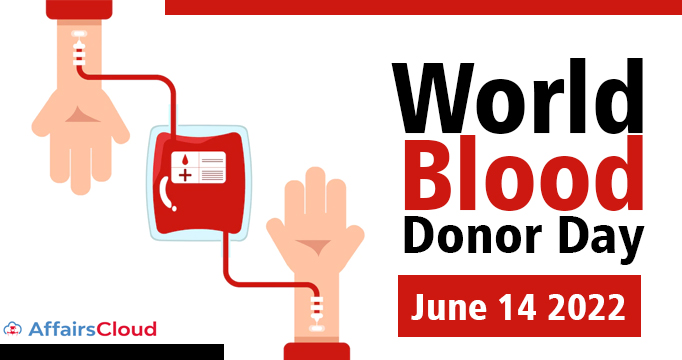
World Blood Donor Day(WBDD) is annually observed across the globe on 14th June to create awareness about the importance of blood donation and to promote voluntary, non remunerated blood donation.
The day also aims to create awareness about the need for safe blood and blood products like Red blood cells (RBCs), Fresh frozen plasma, White blood cells (WBCs), Immune globulins, etc.
- The observance of WBDD is led by the World Health Organisation (WHO).
Host of WBDD 2022 events:
The WBDD 2022 is hosted by Mexico through its National Blood Centre.
- The global event will be held in Mexico City on 14 June 2022.
The theme/slogan of WBDD 2022 is “Donating blood is an act of solidarity. Join the effort and save lives”.
- According to WHO, the theme will highlight the roles of voluntary blood donation in saving lives every year across the globe.
Background:
i.The World Health Organization (WHO) initiated and declared 14th June, the birth anniversary of Austrian biologist Karl Landsteiner, as World Blood Donor Day in 2004.
ii.Following the positive response to the World Blood donor day on 14th June 2004.
iii.In May 2005, the resolution WHA58.13 titled “Blood Safety: Proposal to establish World Blood Donor Day” was adopted during the 58th World Health Assembly(WHA) and proposed to establish World Blood Donor Day.
iv.The WHA agreed to annually observe the 14th June as World Blood Donor Day.
- The WBDD is celebrated as an integral part of the national blood donor recruitment programme.
Karl Landsteiner:
i.Karl Landsteiner (born on 14th June 1868 in Vienna, Austrian Empire (now Austria)), an Austrian biologist, physician, and immunologist distinguished the main blood groups in 1900 and developed the modern system of classification of blood groups.
ii.He was honoured with the “Nobel Prize in Physiology or Medicine in 1930” for the discovery of human blood groups.
Objectives of WBDD 2022:
- To show gratitude to blood donors across the globe and create awareness on the need for regular, unpaid blood donation.
- Highlight the importance of year-round blood donation, to maintain adequate supplies and achieve universal and timely access to safe blood transfusion.
- To promote the values of voluntary unpaid blood donation in enhancing community solidarity and social cohesion.
- To raise awareness of the need for increased investment from governments to build a sustainable and resilient national blood system.
Key Points:
i.Around 118.5 million blood donations are collected globally and more than 40% of these are collected in high-income countries.
ii.In low-income countries, around 54% of blood transfusions are given to children under the age of 5 and in high income countries, around 76% of transfusions are given to people over 60 years.




